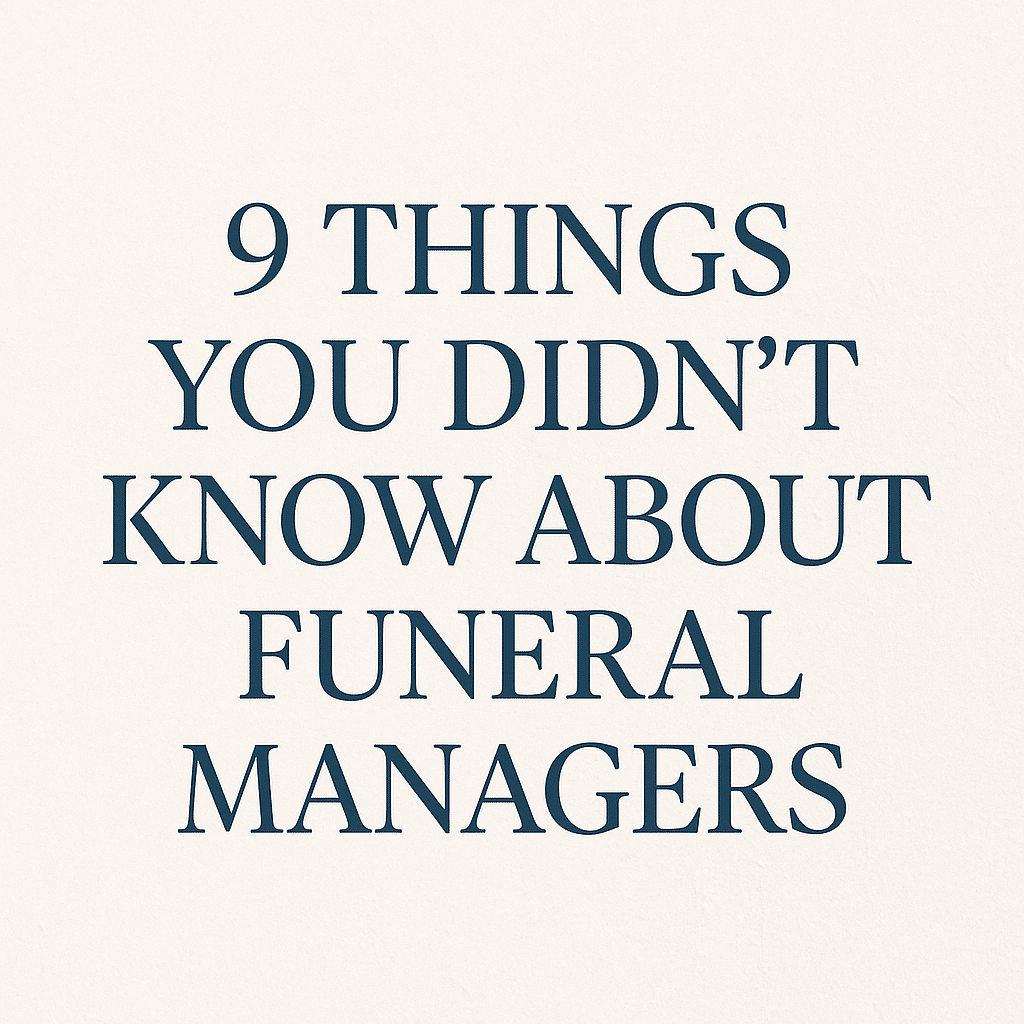When you think of a funeral, you probably picture the somber music, floral arrangements, and that one friend who always wears a tie that’s a little too loud. But behind the scenes, there’s someone orchestrating every detail with precision and care: the funeral manager. You might assume they just handle paperwork and keep things running, but there’s far more to this role than meets the eye.
Here are nine surprising things you probably didn’t know about funeral managers and why their work matters more than you think.
1. They’re Part Event Planner, Part Crisis Manager
Funeral managers don’t just schedule services. They build and coordinate entire events, often with very little notice. From arranging flowers and seating to coordinating religious or cultural customs, they make sure every element aligns with the family’s wishes.
Unlike weddings or corporate events, funeral planning often happens under emotional strain. Funeral managers are trained to handle logistical chaos with a calm demeanor, adjusting to last-minute changes, weather disruptions, and sensitive family dynamics on the fly.
2. They Help Families Navigate Grief Before, During, and After
You might think the relationship ends after the service, but many funeral managers continue supporting families long after the final goodbye. Some offer grief counseling referrals, help manage memorial donations, or check in weeks later just to see how things are going.
In some communities, funeral homes even host holiday remembrance ceremonies or grief support groups. These are not extras. They are part of the role funeral managers quietly take on to serve their community.
3. They’re Experts in Cultural and Religious Traditions
Whether it’s a Buddhist cremation ritual, a Jewish tahara, a Catholic vigil, or a military honors burial, funeral managers need to know how to accommodate and honor a wide range of customs. And not just know about them. They are often responsible for making sure everything is set up correctly, respectfully, and legally.
This sensitivity requires more than training. It demands humility and a commitment to lifelong learning. A good funeral manager doesn’t assume. They ask, they listen, and they adapt.
4. Licensing and Education Requirements Vary Wildly
Not all funeral managers follow the same career path. Some start out as licensed funeral directors or embalmers and rise through the ranks. Others might come from hospitality or social work and learn on the job. While some states require mortuary school and licensure, others have less formal requirements for managerial roles.
That said, top-tier funeral managers usually hold degrees in mortuary science, business management, or a related field. Many are also juggling continuing education to stay current on regulations, green burial options, and technology.
5. They’re Often Small Business Owners Too
Many funeral managers also wear the hat of business owner. They oversee budgets, marketing, staff training, regulatory compliance, and customer service. They’re tracking inventory, maintaining facilities, and managing insurance claims.
This isn’t just about keeping the lights on. It’s about sustaining a legacy. Many funeral homes are family-run businesses passed down for generations. The manager often plays a central role in maintaining trust within the community.
6. They’re Legally Responsible for a Lot
Ever wonder who makes sure the deceased is transported properly, the death certificate is filed, or cremation is authorized by the next of kin? That’s often the funeral manager’s responsibility or at least under their watch.
Each state has its own laws governing funeral services, and funeral managers must make sure their team is following every rule. One wrong step in documentation, refrigeration, or chain of custody can have serious legal and emotional consequences.
7. They See Humanity at Its Most Raw and Real
Funeral managers witness the full spectrum of human emotion. Grief, anger, denial, laughter, awkward jokes, tears of gratitude. They’ve held space for families devastated by tragedy, watched reconciliations happen at wakes, and supported people through some of the most vulnerable moments of their lives.
They develop a kind of emotional intelligence that’s hard to teach. The best ones know when to be present, when to step back, and when a well-timed tissue box says more than any words.
8. Technology Is Changing the Job Fast
Gone are the days of filing everything by hand. Today’s funeral managers work with digital booking systems, livestreaming tools, AI-powered obituary platforms, and customer satisfaction software.
Some offer full virtual planning services with video chats, online forms, and digital legacy tools. Others are experimenting with augmented reality memorials or biodegradable QR-coded urns. Funeral managers have to keep up with the tech while still delivering the human connection that families need.
9. Most People Have No Idea What They Do Until They Need One
Despite how central they are to the funeral experience, funeral managers often fly under the radar. Many people don’t meet one until a crisis hits, and by then, they’re leaning on that person for answers to dozens of emotionally loaded questions.
The reality is that funeral managers are the invisible thread pulling everything together during a moment when people feel unraveled. They plan, coordinate, comfort, troubleshoot, and advocate, often in the same hour.
Final Thought: A Role That Deserves More Credit
Funeral managers aren’t just administrators. They’re guides, guardians, and quiet heroes of the end-of-life journey. They blend logistical excellence with emotional care, and they do it in an industry where the stakes are deeply personal. The next time you attend a funeral that feels seamless and thoughtful, know that someone made that happen and likely lost sleep to do so.
If you have feedback, questions, or ideas for future articles or Information Hubs, please contact us. Your insights help us create valuable content.


